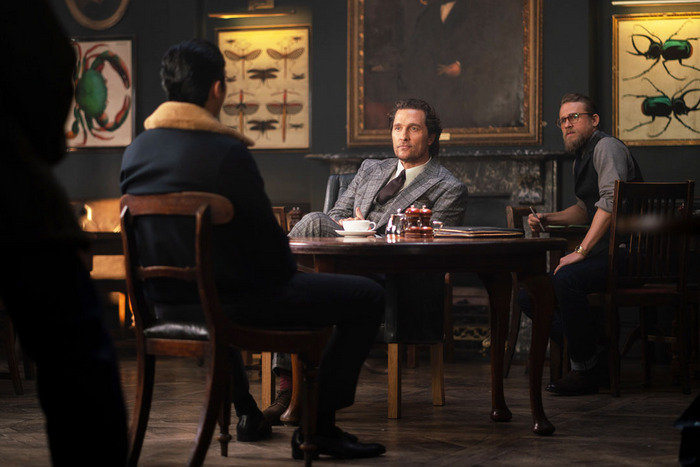As The Gentlemen opens, you can practically smell the cigar smoke and taste the bourbon marinating in the room, as two lads are chatting next to a crackling fire. On one side of the room is Ray (Charlie Hunnam), the right-hand man of a drug lord. On the other side is Fletcher (Hugh Grant), a reporter hoping to blackmail him. The two trade insults until Fletcher reflexively asks, “Can I tell you a story?” The story makes up the movie’s plot, which was written and directed by Guy Ritchie, and is told in flashback sequences brimming with colorful characters and intoxicating action.
The story of Ritchie’s career has been one of ups and downs, of course. His popularity took off faster than a speeding bullet when Lock, Stock and Two Smoking Barrels was released in 1998, and was solidified with Snatch in 2000. The director made a name for himself with these electrifying gangster yarns. Then he married Madonna. The couple divorced back in 2008, but for whatever reason, his career never recovered. He’s made boring blockbuster after boring blockbuster (Sherlock Holmes, Aladdin) ever since. The good news is that the director is back to his devilish old tricks in The Gentleman, and it marks a return to his prima donna days (his literal pre-Madonna days), when his flair and flamboyant style was front and center.
Fletcher kicks off his story with Ray’s boss, Micky Pearson (Matthew McConaughey), a drug dealer with enough pot to smoke out an entire city. Pearson wants to expand his business by buying land from a local gentry, but he also needs someone to buyout his company so he can eventually leave the game for good. This sparks a bidding war between a posh business man (Jeremy Strong) and an angry “Chinaman” (Henry Golding), which turns into an all-out-war when a hybrid strain of weed is stolen.
Combining aspects from the gangster and whodunit genres, The Gentlemen offers plenty of twists and turns, and it’s enthralling to watch Ritchie return to his provocative roots with the material. People are thrown off balconies and heads are hacked off. Characters use every curse word imaginable, and then make up more once they run out of things to say. Some will find the crudeness off-putting, while others will find it refreshing at a time when R-rated comedies are nearly extinct within the hypersensitive cultural landscape.
Just about everybody will enjoy the performances, though. These may not be the most relatable characters or even people we want to root for (Pearson is the protagonist, even though he runs a drug ring, while blackmailer Fletcher is supposed to be the antagonist, even while his twisted narration makes the story fun). Grant, who famously starred in rom-coms like Love Actually in the 2000’s, has been playing against type as of late. Between this and Paddington 2, the actor has nailed the role of sardonically sassy villain. Every situation that falls on McConaughey makes an impression, much like cement. Whether his kingpin is shooting hoodlums in the crotch or rambling about how he’s the king of the jungle, he tackles each scene with the same laid-back swagger that makes his Lincoln commercials hard to resist. Colin Farrell also charms in a brief cameo, and Hunnam is terrific as Ray.
And the more these character’s cause conflict, the more Ritchie indulges in his stylized techniques. There’s freeze frames, flash forwards, unreliable narrators, aspect ratio changes, film stock and gel change-ups; in one shot, a roundhouse kick connects with the camera, leaving the lens cracked for the remainder of the scene. It’s the sort of showmanship that audiences have grown to expect from Tarantino, and it incites a similar crazed energy here, suggesting Ritchie is ready to steer his career back in a blood soaked direction that’s anything but gentle.
Advertising disclosure: We may receive compensation for some of the links in our stories. Thank you for supporting LA Weekly and our advertisers.

